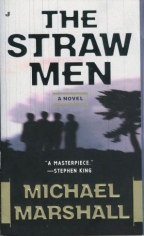The Straw Men
Michael Marshall (Smith)
Jove / Penguin Putnam
US Mass Market Paperback
ISBN 0-515-13427-9
Publication Date: 08-04-2002
389 Pages; $6.99
Date Reviewed: 08-16-02
Reviewed by Rick Kleffel © 2002

REFERENCES
COLUMNS
|
|
|
The Straw MenMichael Marshall (Smith)Jove / Penguin PutnamUS Mass Market PaperbackISBN 0-515-13427-9Publication Date: 08-04-2002389 Pages; $6.99Date Reviewed: 08-16-02Reviewed by Rick Kleffel © 2002 |
|
|
REFERENCES |
COLUMNS |
The "unified field theory" has a lot of attraction no matter what the discipline. We always want a single source for everything be it a god to reward the believers and reign down the fires of hell upon the unbelievers, or a law of physics to explain everything from gravity to galaxies. In 'The Straw Men' Michael Marshall Smith, writing as Michael Marshall, goes for a unified field theory of serial killers. He wants to create a web of fear so pervasive, so ingrained to our society that it seems as if there is no escape. 'The Straw Men' succeeds on many levels, but it never quite reaches the rarified heights it aims for. However, Smith's subject is extremely timely. With the United States gripped by a media-enhanced fear of child-abductions and killings, 'The Straw Men' may be terrorizing enough -- and filled with enough great writing -- to distract readers from its flaws.
Three events trigger off the novel; a mass killing in a McDonalds, the kidnapping of a teenaged girl in Santa Monica, and the death of a man's parents in Montana. By the end of the novel, the reader knows that Smith will have all three tied together. The question is how much else will get pulled in and how successfully will the writer do the job. The problems with novel present themselves fairly quickly. Smith is a master of smirking prose; he can write a clever, witty sentence like nobody's business. But smirking prose doesn't meld well with the serious subject of serial killers and child abductions. Smith's non-smirking prose is excellent to be sure, but there's something missing when he's constrained by his own good taste. The reader never wants Smith to go over-the-top; it wouldn't work towards the fear-inducing goal that Smith clearly has in mind. But every time the Smith manages to get in one of his cleverly-worded and witty observations, the novel lifts itself up above the parts where the writer is merely getting scary.
Smith splits the narrative between first and third person portions. The first person portions are narrated by Ward Hopkins, ex-CIA-analyst, now aimless nothing, grieving for his parents' death. Investigating, he finds that all is not as it seems. His parents' house yields clues that lead beyond, and to a rendezvous with his friend Bobby who still works for "the Company".
The third person portions of the novel concern Nina Baynam of the FBI and John Zandt, an LAPD officer until his daughter was taken by a serial killer known as 'The Upright Man'. When the killer takes a teenaged girl from the Santa Monica Third Street Mall, Nina pulls Zandt back into the case. Slowly, the paths of Hopkins, Bobby, Nina and Zandt converge. The girl is alive; she can be saved if someone can find The Upright Man. Alas, it's all so "Silence of the Lambs".
Smith, who is from the UK, can write up a hell of scene, be it in a Pennsylvania McDonalds or a Southern California Mall. But a crucial UK/US mistake early in the novel hinders believability. Fortunately, Smith is a great prose writer, especially when he's making simple, universal cultural observations. He can write up a rap that would suit the finest stand-up comedian or commentator. He can offer fine turns of character for Nina, Zandt, Hopkins and Buddy. But it takes a while for the first to third person transitions to really work, and they never flow effortlessly.
When Smith wants to pull together a frightening conspiracy, he's really on to some primal fear inducing fiction. Like Lovecraft, he's best when he's simply suggesting what's possible. When events come down to guns, cars and explosions, he can't quite escape the dumbing-down factor that typical movie denouements involve. Characters and prose remain fine, but the overall effect is not as strong as his other novels.
'The Straw Men' is certainly an ambitious novel, but the ambitions appear to clearly include "movie deal". Smith is a fantastic writer, and he comes very close to pulling the bigger ideas off in a fine fashion. Worth reading for Smith's usual excellent prose and some very scary scenes, 'The Straw Men' demonstrates more potential than it manages to realize.